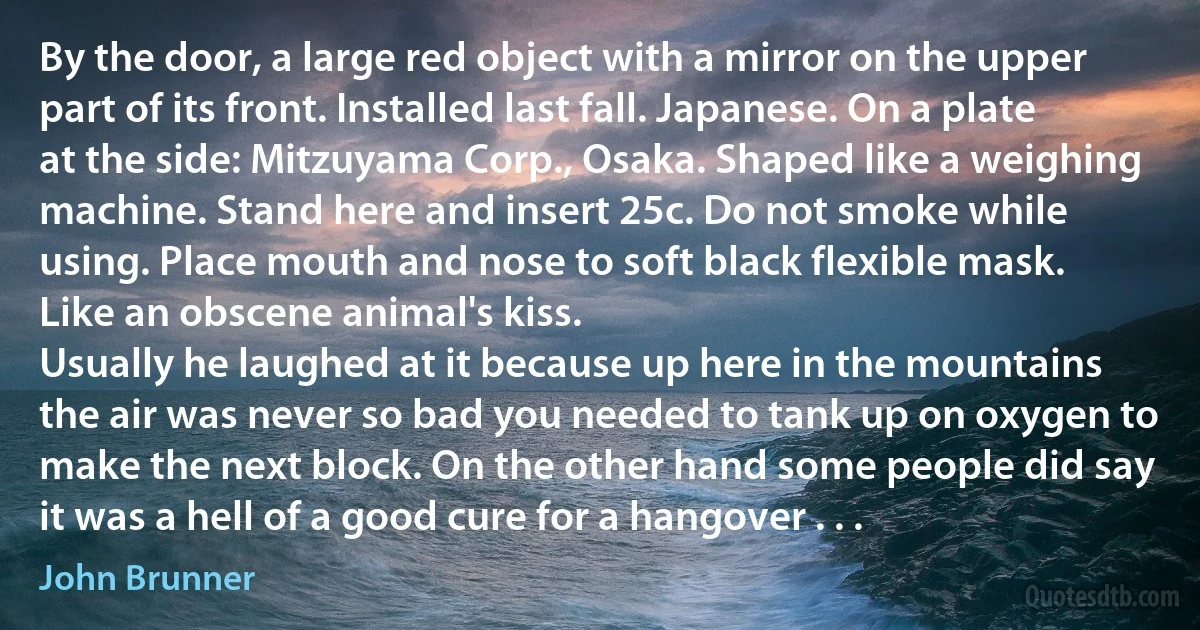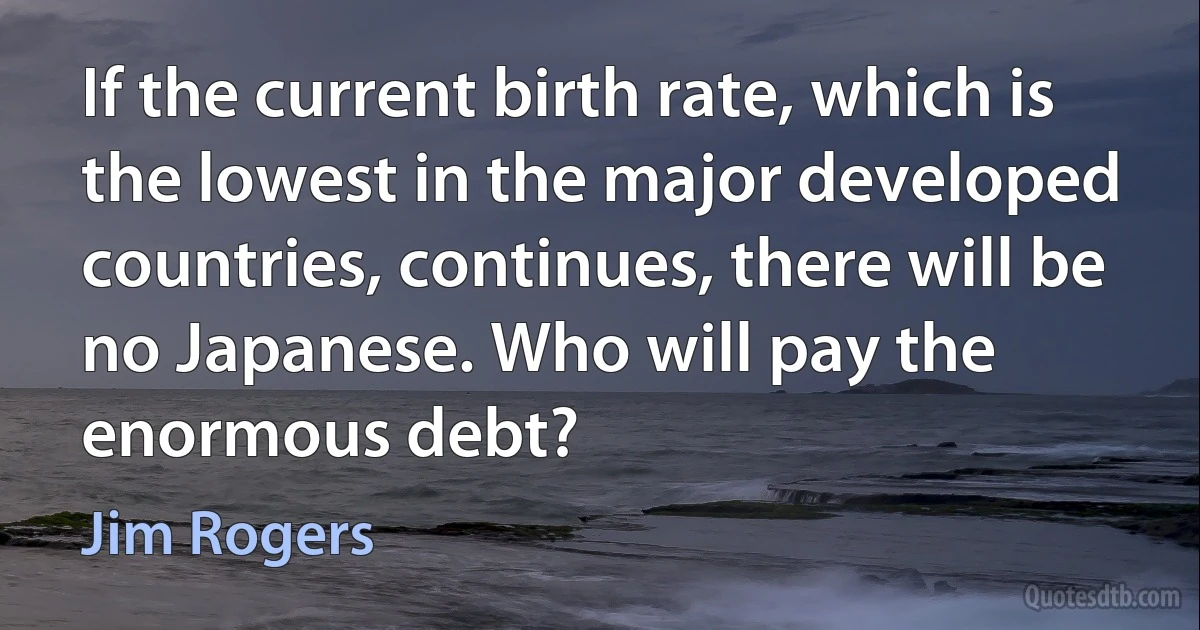Japanese Quotes - page 9
After the war, Japan was occupied by the allied forces, and based on peace and democracy as values to be upheld, established the Constitution of Japan, undertook various reforms and built the foundation of Japan that we know today. I have profound gratitude for the efforts made by the Japanese people at the time who helped reconstruct and improve the country devastated by the war. I also feel that we must not forget the help extended to us in those days by Americans with an understanding of Japan and Japanese culture. Today, more than sixty years since the end of the war, we have seen that, in the face of major disasters such as the Great East Japan Earthquake [March 11, 2011], there are so many people in Japan who value the bonds between people, can deal with various situations calmly, and work hard towards reconstruction. I have found this most reassuring.

Akihito
You'd be alone in the kitchen and twilight would be dwindling, and you could hear the far off cries of the other children playing nearby. You'd be alone in the kitchen because it was your special treat time, where the jelly would come out just for you, and your mother would appear at your side just as a vision of Laura Ashley print dress, smelling of magnolias and biscuits and put the jelly in front of you, and you would pull your chair in. Then the old fashioned bar of ice cream would come down, the one that had to be cut with a breadknife before the two sides were flanked with wafers. You would lift your little spoon up excitedly and winkle out that first divet of black jelly... AND THEN THE CAGE COMES DOWN! The cage with the Japanese fighting spiders inside, your mother strikes a match off her forearm and tells you to dance in the front room for money... You, you never forget that shit, I mean it never goes away.

Dylan Moran
Rumors that Moscow is helping me must be due to the fact that while I was Chief of Police of the Town of Sakhalin-Ula I used to dine twice a year with the Soviet officials. I can swear that no foreigners have given or are giving me guns, munitions, supplies or money! I want the League of Nations to fulfill its duty. I want it to force the Japanese to withdraw from Northern Manchuria. If I am forced to abandon Tsitsihar I intend to retire into the back country.

Ma Zhanshan
I studied Japanese language and culture in college and graduate school, and afterward went to work in Tokyo, where I met a young man whose father was a famous businessman and whose mother was a geisha. He and I never discussed his parentage, which was an open secret, but it fascinated me.

Arthur Golden
The Tale of Genji in particular is the highest pinnacle of Japanese literature. Even down to our day there has not been a piece of fiction to compare with it. That such a modern work should have been written in the eleventh century is a miracle, and as a miracle the work is widely known abroad.

Yasunari Kawabata
Ikenobo Sen'o, a master of flower arranging, once said (the remark is to be found in his Sayings): "With a spray of flowers, a bit of water, one evokes the vastness of rivers and mountains." The Japanese garden too, of course symbolizes the vastness of nature. The Western garden tends to be symmetrical, the Japanese garden asymmetrical, and this is because the asymmetrical has the greater power to symbolize multiplicity and vastness. The asymmetry, of course, rests upon a balance imposed by delicate sensibilities. Nothing is more complicated, varied, attentive to detail, than the Japanese art of landscape gardening. Thus there is the form called the dry landscape, composed entirely of rocks, in which the arrangement of stones gives expression to mountains and rivers that are not present, and even suggests the waves of the great ocean breaking in upon cliffs.

Yasunari Kawabata
Never before in the history of warfare has there been a more convincing example of the effectiveness of sea power than when, despite this undefeated, well armed, and highly efficient army, Japan surrendered her homeland unconditionally to the enemy without even a token resistance. The devastation wrought by past bombings plus the destruction of the atomic bombs spelled nothing less than the extinction of Japan. The bases from which these attacks were launched- Saipan, Iwo Jima, and Okinawa- were to have been the spring boards for the mightiest sea-borne invasion yet conceived by man. The "fighting fleets" of the United States which had made possible every invasion victory for America were ready and waiting. The Japanese had two alternatives; to fight and face destruction, or to surrender. The Imperial Japanese Empire chose to surrender.

William Halsey
I was... told by a person who had known him [future Emperor Nicholas II] intimately from his childhood, that, though courteous, his main characteristic was an absolute indifference to most persons and things about him, and that he never showed a spark of ambition of any sort. This was confirmed by what I afterward saw of him at court. He seemed to stand about listlessly, speaking in a good-natured way to this or that person when it was easier than not to do so; but on the whole, indifferent to all which went on about him. After his accession to the throne, one of the best judges in Europe, who had many opportunities to observe him closely, said to me, "He knows nothing of his empire or of his people; he never goes out of his house, if he can help it." This explains in some degree the insufficiency of his program for the Peace Conference at The Hague and for the Japanese War, which, as I revise these lines, is bringing fearful disaster and disgrace upon Russia.

Andrew Dickson White
The suggestion that words are symbols for things, actions, qualities, relationships, et cetera, is naive, a gross simplification. Words are slippery customers. The full meaning of a word does not appear until it is placed in its context, and the context may serve an extremely subtle function -- as with puns, or double entendre. And even then the "meaning" will depend upon the listener, upon the speaker, upon their entire experience of language, upon their knowledge of one another, and upon the whole situation. Words do not "mean things" in a one-to-one relation like a code. Words, too, are empirical signs, not copies or models of anything; truly, onomatopoeia and gestures frequently seem to possess resemblance, but this resemblance does not bear too close examination. A cockerel may seem to say cook-a-doodle-do to an Englishman, but a German thinks it says kikeriki, and a Japanese kokke-kekko. Each can paint only with the phonetic sound of his own language.

Colin Cherry
You see, whether you can draw like this or not, being able to think up this kind of design, it depends on whether or not you can say to yourself, 'Oh, yeah, girls like this exist in real life.' If you don't spend time watching real people, you can't do this, because you've never seen it. Some people spend their lives interested only in themselves. Almost all Japanese animation is produced with hardly any basis taken from observing real people, you know. It's produced by humans who can't stand looking at other humans. And that's why the industry is full of otaku!

Hayao Miyazaki



